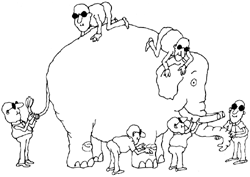A fascinating children's story based on a folk tale dating back at least two-thousand years offers direct insight into what happens when the systems view is not taken in studying a problem. In this tale there are six men who, though very knowledgeable, are blind. Together they encounter an elephant and each gives his analysis of the "system." Their interpretations are based on the particular part of the elephant (system) they happen to touch.
The first blind man touches the sturdy side and declares the elephant to be very much like a wall.
The second blind man felt the elephants sharp tusk and declared the elephant to be like a great spear.

The third blind man grasped at the squirming trunk and with great authority announced that elephants are certainly like snakes.
The fourth blind man slid his hands along the elephants broad knee and said that clearly an elephant can be best described as a tree.
Now the fifth blind man examined the elephants waving ear and was convinced that the elephant was some sort of a fan.
And the last, the sixth blind man grabing at the elephants swinging tail declared to all around that an elephant is absolutely like a rope.
Each is partly right since they have made contact with one major subsystem. However, they are all wrong because in their blindness they failed to comprehend the system as a whole. Too often in information systems work the limited perspectives (particular blindnesses) of the individuals making a study lead to similar failures in perception.
These failures result in developing computer capabilities that do not meet the needs of users. There seems to be a bias, especially in our western culture, toward looking at things in a fragmented way. As a consequence, the non-systems view prevails in much of our problem-solving.
More than any amount of explaining, this children's story simply illustrates the need for the systems view for information systems in organizations. As it is often the case with "stories" of enduring interest, they contain the seeds of wisdom acquired by a culture through centuries of practical experience.
If you would like to relive the childhood memory of first hearing this tale, a well illustrated version is John Godfrey Saxe's The Blind Men and the Elephant (McGraw-Hill Book Company, 1963). The children's section of most public libraries will have Saxe's or another version of this valuable insight for the information systems user. (Note 5)